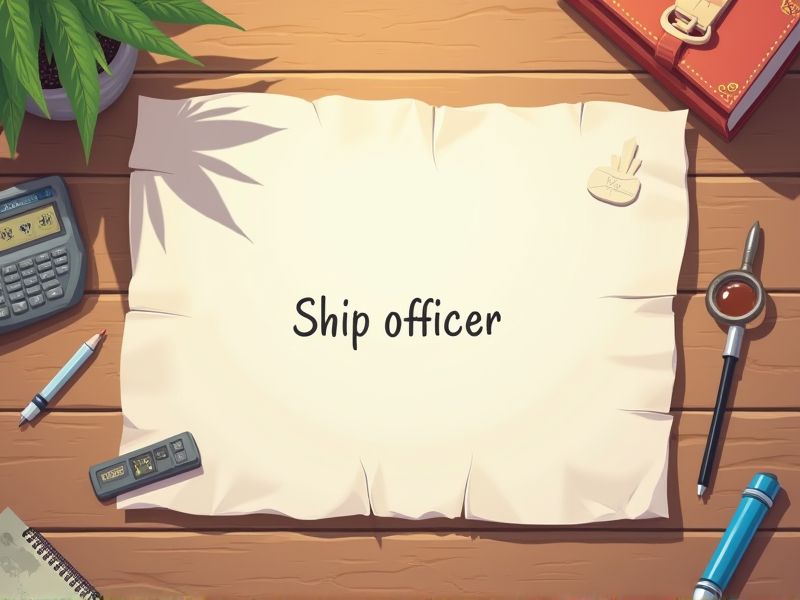
Ship officers are responsible for navigating vessels and managing crews, requiring comprehensive knowledge and specialized skills. Specific certifications ensure officers are equipped to handle emergencies, compliance with international maritime laws, and address technical challenges aboard. Certification is crucial in maintaining standard operating procedures and enhancing safety across diverse maritime environments. Here are some important certifications required for a Ship officer.
STCW Basic Safety Training Certificate
The STCW Basic Safety Training Certificate ensures ship officers have fundamental knowledge in maritime safety protocols, enhancing overall ship security. Compliance with the International Maritime Organization's STCW Convention is necessary for legal operations, reducing legal risks for shipping companies. Officers equipped with this training can respond effectively to emergencies, minimizing potential harm to crew and cargo. The certificate helps standardize maritime safety practices globally, facilitating safer international shipping operations.
STCW Advanced Fire Fighting Certificate
The STCW Advanced Fire Fighting Certificate equips ship officers with essential skills to manage and extinguish fires on board, enhancing maritime safety. Regulations require ship officers to be competent in advanced fire prevention and response techniques, as outlined by the International Maritime Organization. Having this certification ensures officers can coordinate fire emergency teams effectively, minimizing risk to crew and vessel. The training prepares officers to handle complex fire scenarios, which could prevent catastrophic damage and ensure continued operation of maritime activities.
STCW First Aid & Medical Care Certificate
The STCW First Aid & Medical Care Certificate ensures that ship officers can respond effectively to medical emergencies at sea, where immediate professional medical help may not be available. International maritime regulations mandate this certification to maintain safety and health standards aboard vessels. Knowledge of first aid and medical care reduces risks of severe outcomes from injuries or illnesses, enhancing overall crew and passenger well-being. Training in medical care fosters a safer working environment, crucial for complying with global maritime safety codes.
STCW Personal Survival Techniques Certificate
Holding an STCW Personal Survival Techniques Certificate equips ship officers with essential skills for emergency situations at sea. This certification ensures that officers understand proper life-saving procedures, such as handling life rafts and basic first aid. Compliance with the STCW standards enhances overall maritime safety and operational efficiency. The requirement of this certification aligns with international regulations aimed at preventing maritime accidents.
STCW Security Awareness Certificate
The STCW Security Awareness Certificate equips ship officers with the skills to identify security threats, enhancing the overall safety on board. Regulations by the International Maritime Organization mandate this certification, aligning with global maritime security standards. Certification ensures officers can communicate effectively during security incidents, facilitating coordinated response efforts. A well-trained officer contributes to risk mitigation, supporting safe and secure maritime operations.
GMDSS Operator Certificate
The GMDSS Operator Certificate ensures that ship officers can effectively use the Global Maritime Distress and Safety System, a crucial safety network for maritime communication. Having this certification enables officers to manage distress signals and coordinate rescue operations efficiently, potentially saving lives during emergencies. Adherence to international regulations like the International Maritime Organization mandates this certification for safety compliance, enhancing overall maritime safety standards. The certificate also assures that officers can utilize advanced technology to navigate weather warnings and safety messages, promoting safer voyage planning.
Bridge Resource Management Certificate
The Bridge Resource Management Certificate is crucial because it enhances a ship officer's ability to manage human and technical resources efficiently on the bridge. This certificate helps in fostering better communication and teamwork among crew members, reducing the likelihood of errors. The training focuses on situational awareness, ensuring that officers can effectively assess and respond to maritime conditions and emergencies. Adhering to these practices can lead to increased safety and compliance with international maritime regulations.
Maritime English Proficiency Certificate
The Maritime English Proficiency Certificate is essential for ship officers because it ensures effective communication among a multinational crew, reducing the risk of misunderstandings that can lead to operational errors. It aligns with international standards set by organizations like the International Maritime Organization, which emphasize the importance of English proficiency for safety and navigation. Possessing this certification enhances the officers' ability to follow complex instructions and technical manuals, critical for maintaining vessel operations. The certificate also increases employment prospects in the global shipping industry, where English is the lingua franca.
Navigation and Ship Handling Simulator Training Certificate
Acquiring a Navigation and Ship Handling Simulator Training Certificate equips ship officers with critical skills to handle complex maritime scenarios. These simulations expose trainees to potential emergencies, enhancing decision-making and crisis management abilities. Insurance companies and maritime regulators often mandate this certification to ensure compliance with safety standards. Training on simulators minimizes the risk of actual operational errors, contributing to overall maritime safety.
Engine Room Resource Management Certificate
An Engine Room Resource Management Certificate equips ship officers with essential skills in team coordination and communication, leading to enhanced safety and efficiency in engine room operations. International regulations like the STCW convention mandate these certifications to ensure uniform standards across maritime professionals. In high-pressure scenarios, the knowledge from this certification helps officers make informed decisions and avoid critical mistakes. The onboard collaboration it fosters can significantly reduce the likelihood of equipment failure and subsequent operational disruptions.
Summary
When you obtain certifications as a ship officer, your skills and expertise become more recognized in the maritime industry. These credentials can lead to better job opportunities and increased responsibilities on board. Employers perceive certified officers as more competent and reliable, often resulting in higher pay and career advancement. Such certifications also enhance safety and operational efficiency on the ship.
